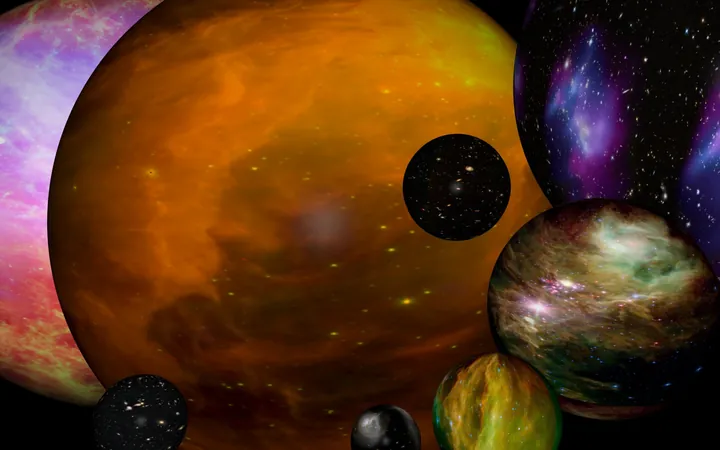
Groundbreaking Study Aims to Put the Anthropic Principle to the Test: Is Our Universe Really Tailored for Life?
2024-12-09
Author: John Tan
Introduction
A new study published in the Journal of Cosmology and Astroparticle Physics by physicists Nemanja Kaloper from the University of California, Davis, and Alexander Westphal from the Deutsches Elektronen-Synchrotron (DESY) proposes an experimental test for the Anthropic Principle (AP). This principle posits that our universe is fine-tuned to support life, a concept first introduced by Brandon Carter in 1973. Since its inception, the AP has ignited heated discussions among scientists and philosophers alike.
Understanding the Anthropic Principle
The Anthropic Principle encompasses various interpretations, the simplest being the "weak" version, which states that because we are here to observe the universe, it must have developed in a way that allows for intelligent life. The "strong" version, however, goes further, implying that the universe necessarily evolved to support our existence, treading into speculative territory that many consider beyond empirical science.
Criticism of the Anthropic Principle
Critics of the Anthropic Principle argue that it lacks practical utility for scientific investigation, as it doesn’t provide measurable predictions that could be tested against observations. Hence, many view it as more philosophical than scientific. Notably, the AP suggests that specific initial conditions must have existed for our universe to be conducive to carbon-based life. For example, the values of key physical constants—like the gravitational constant and the electron charge—must be exceptionally calibrated. Alterations to these values could yield an unrecognizably different and potentially inhospitable universe.
Kaloper and Westphal's Research
Kaloper and Westphal’s research seeks to establish a method for testing the AP experimentally. By calculating how the universe could have evolved from specific initial conditions aligned with the AP, and then comparing those predictions to actual astronomical observations, researchers hope to quantify the validity of the principle.
Key Cosmological Concepts
Cosmic Inflation
The universe experienced a rapid expansion shortly after the Big Bang, during which it grew from nearly an infinitesimal size to something comparable to a grape or soccer ball almost instantly. This period, driven by quantum phenomena, facilitated the structure formation we observe today, including galaxies and stars. Though we lack direct evidence of cosmic inflation, it remains a widely supported theory anticipated to gain observational backing in the near future.
Dark Matter
Approximately 80% of the matter in the universe is deemed "dark matter," a mysterious substance that does not emit or absorb light, making it challenging to detect. Current research aims to unravel its properties, with several promising hypotheses in the running.
Axions
A candidate for dark matter, axions are lightweight particles theorized to have formed in abundance during cosmic inflation. They offer a compelling explanation for certain quantum phenomena and are expected to minimally interact with regular matter. Future observations of black holes may help affirm their existence.
Future Experiments and Implications
Kaloper emphasizes that testing the AP could hinge on the results of upcoming experiments. One exciting prospect is the LiteBIRD satellite, scheduled for launch in 2032, which aims to detect primordial gravitational waves that could support high-scale inflation theories. Additionally, indications of ultralight axions might emerge from surveys of supermassive black holes, potentially observable through their influence on these cosmic giants.
However, if explorations reveal that dark matter consists predominantly of particles other than axions, it might suggest that the Anthropic Principle does not hold. Conversely, if these observations affirm the presence of axions as dark matter, it would bolster the principle's validity.
Conclusion
The stakes are high and the ramifications profound. If proven inaccurate, the AP may necessitate a fundamental reevaluation of our understanding of initial conditions in the universe. Kaloper suggests that we might encounter situations where some initial conditions are inherently improbable or impossible, hinting at more complex cosmological theories than previously envisioned.
As we look ahead, the next few years hold significant promise for discovering evidence that may either validate or challenge the Anthropic Principle. How radically would our understanding of the universe shift if we find that it fails the test? The potential consequences are nothing short of mind-bending. Stay tuned as we await test results that could redefine our place in the cosmos.




 Brasil (PT)
Brasil (PT)
 Canada (EN)
Canada (EN)
 Chile (ES)
Chile (ES)
 España (ES)
España (ES)
 France (FR)
France (FR)
 Hong Kong (EN)
Hong Kong (EN)
 Italia (IT)
Italia (IT)
 日本 (JA)
日本 (JA)
 Magyarország (HU)
Magyarország (HU)
 Norge (NO)
Norge (NO)
 Polska (PL)
Polska (PL)
 Schweiz (DE)
Schweiz (DE)
 Singapore (EN)
Singapore (EN)
 Sverige (SV)
Sverige (SV)
 Suomi (FI)
Suomi (FI)
 Türkiye (TR)
Türkiye (TR)